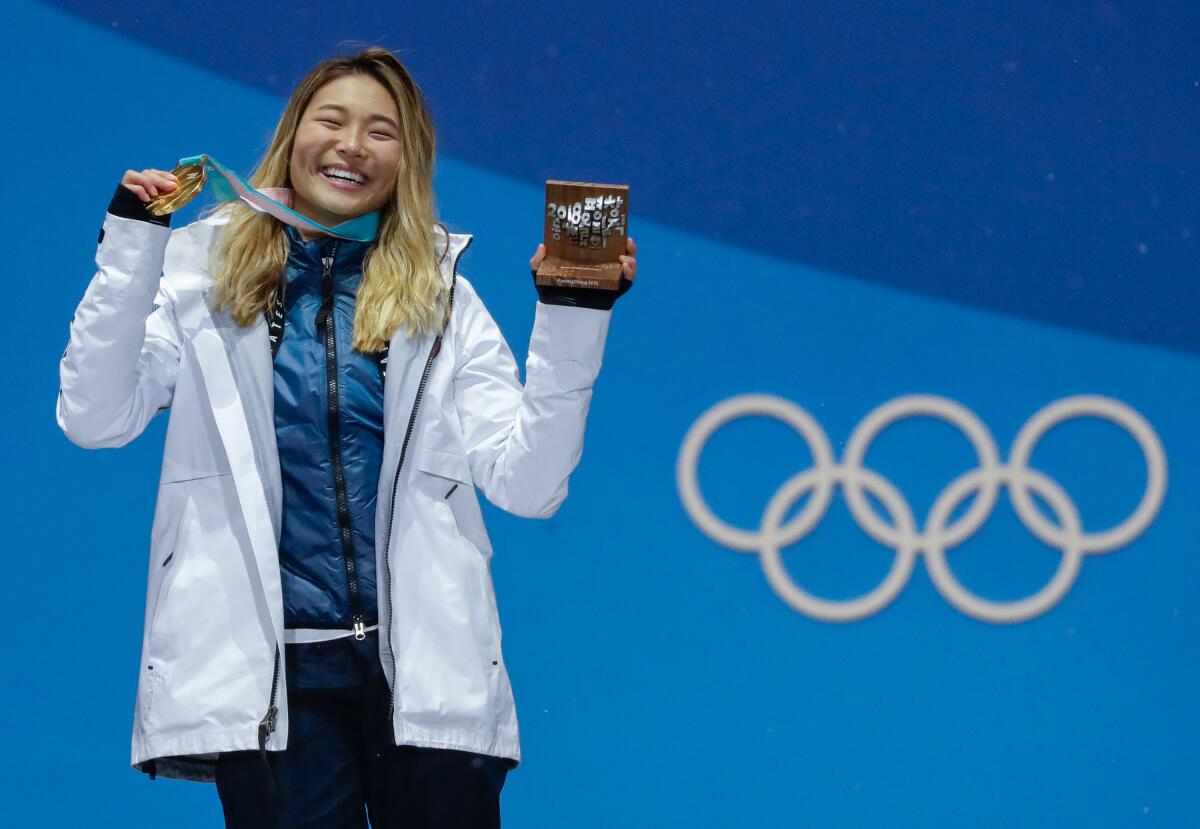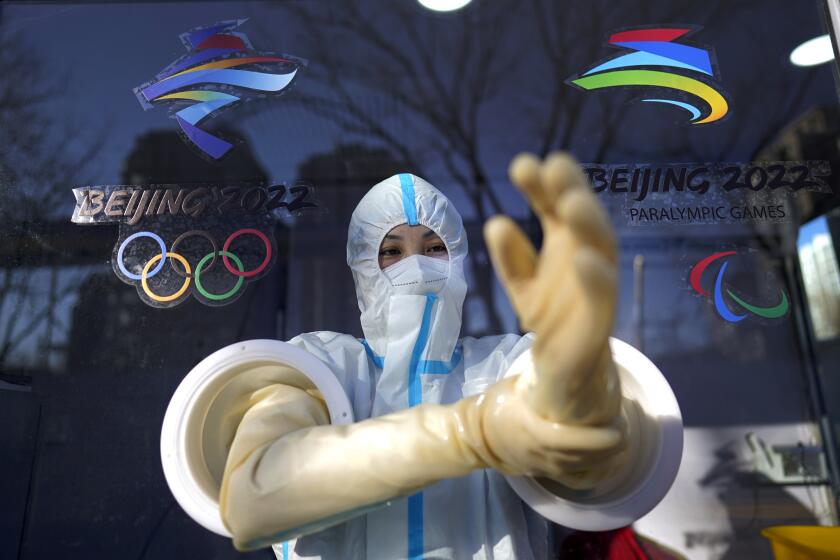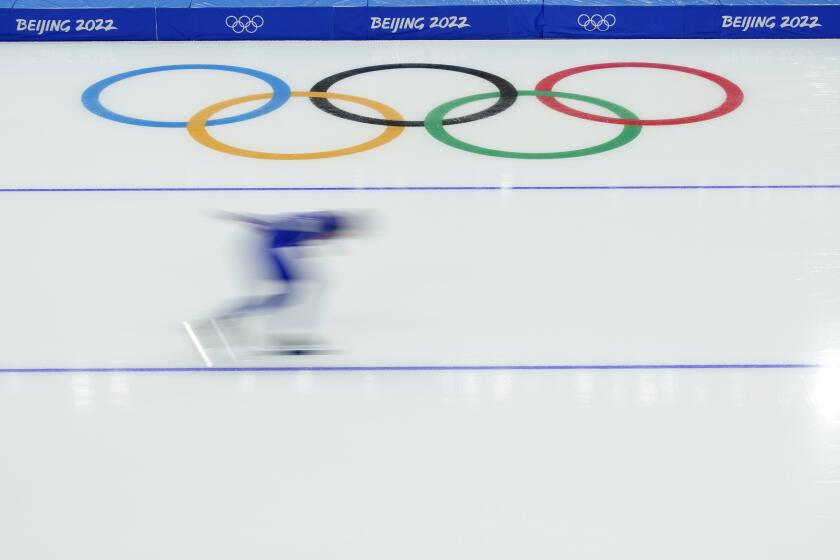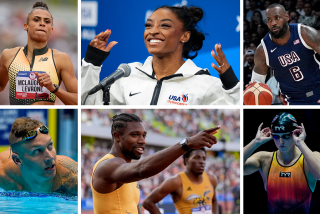How many medals will the U.S. win during the Beijing Olympics? COVID could alter the forecast

- Share via
BEIJING — The sprawling Olympic Green is lined with brightly lit trees, an enormous glowing statue of the Winter Games mascot, an ice suit-wearing panda named Bing Dwen Dwen, and synchronized light shows speed along the sides of the 846-foot Olympic Tower.
But the festive scene each night near several high-profile venues belies the pandemic-fueled uncertainty that permeates these Games.
Everyone is tested daily for the coronavirus inside the Olympic bubble that’s separated from the rest of society by high fences, security guards and surveillance cameras. Some staffers wear white hazmat suits. Temperatures are automatically scanned when entering buildings. News of the latest athlete to test positive and be whisked to an isolation facility trickles out through social media posts or brief written statements.
As organizers apply China’s zero-COVID policy to the Games that open Friday, no one knows how the 17-day celebration of winter sports will play out.
The U.S. contingent is projected to finish fourth in the medal standings, but the still-simmering virus and strict prevention measures could upend an event or team in an instant.
When Gracenote, a sports analysis and data company, released its final medal prediction this week, it cautioned “there is potential for the Beijing Winter Games to be more unpredictable than normal” thanks to the virus.
“The problem is that we do not know who may or may not be out of competition due to a positive COVID test,” Simon Gleave, Gracenote’s head of sports analysis, said in an email.
Olympic athletes are coping with intense anxiety over COVID test results, with positive results a constant threat to knock them out of competition.
Though the Tokyo Olympics faced similar questions during the summer, the impact of the virus on competition proved to be minimal. But the highly contagious Omicron variant emerged in the six months since those Games and Beijing organizers have adopted a stringent approach in an attempt to keep the virus at bay.
As of Tuesday, there have been 232 positive coronavirus cases at these Games.
Elana Meyers Taylor, the U.S. bobsled star who is a three-time Olympic medalist, announced Tuesday that she tested positive after arriving, but is asymptomatic. She could be cleared in time to compete in the monobob starting Feb. 13 or two-person bobsled starting Feb. 18, but the situation underscored how quickly these Games can change.
“This is just the latest obstacle that my family and I have faced on this journey, so I’m remaining optimistic that I’ll be able to recover quickly and still have the opportunity to compete,” she wrote on Instagram.
Seven members of the 428-person Team USA delegation are in isolation after testing positive, including two athletes. The United States Olympic and Paralympic Committee has not revealed any of the people who have tested positive.
Positive tests have knocked some athletes out of the Games even before traveling to Beijing. They include Austria’s Marita Kramer, the world’s top female ski jumper, and Russian figure skater Mikhal Kolyada, a three-time national champion.
But the Games, where only a limited number of domestic spectators will be allowed to attend competitions, push forward. Gracenote predicts the U.S. will win 22 medals, including seven gold. That would be down from the 23 won four years ago at the Pyeongchang Games in the country’s worst showing in two decades. The total prompted Alan Ashley, then Team USA’s chief of sport performance, to pledge after the Games that, “We’re going to take a hard look at what occurred.”
The six U.S. athletes who won individual gold medals in Pyeongchang all return – snowboarders Jamie Anderson, Red Gerrard, Chloe Kim and Shaun White; Alpine skier Mikaela Shiffrin; and freestyle skier David Wise.

Shiffrin, the top-ranked women’s skier on the World Cup circuit, could compete in five individual events and has the best chance of any American to win multiple individual gold medals. The path here hasn’t been easy. She tested positive for the coronavirus in late December, but returned to competition eight days after announcing the result.
“You’ve seen some athletes really having to struggle to get back,” Shiffrin told reporters after returning last month. “But I feel normal. That’s really perfect. It was great to be able to have the best case scenario with my positive case. … I’m really lucky, actually.”
Nathan Chen, the figure skater who has won six consecutive U.S. titles, will challenge Japan’s Yuzuru Hanyu for gold. Longtime Canadian bobsledder Kaillie Humphries, who was sworn in as a U.S. citizen in December, is another medal contender. The U.S. women’s hockey team — 15 of the 23 players have Olympic experience — can win gold. Jessie Diggins (cross country skiing) and Brittany Bowe (speed skating) are among other U.S. contenders for gold.
The pandemic has left athletes relieved to arrive in the bubble without incident and be able to turn their attention to chasing medals.
The joy and celebration of past Games is missing in Beijing as the Winter Olympics head down a soulless path devoid of fun.
“[We] were really struggling with everything it took to get here,” Anderson said. “Now that we’re here and settled into our apartment and figuring out the food and schedule, I think we’re really stoked.”
Gracenote projects Norway (21 golds, 44 total medals) will top the medal standings for the second straight Olympics, followed by Germany (11 gold, 30 total medals) and the Russian Olympic Committee (10 gold, 30 total medals).
While Gracenote penciled China in for 13 medals — a significant improvement over its nine medals in Pyeongchang — the company noted that the pandemic has prevented many of the host country’s winter athletes from competing in major international events.
Like everything else in Beijing, the result is uncertain.
More to Read
Go beyond the scoreboard
Get the latest on L.A.'s teams in the daily Sports Report newsletter.
You may occasionally receive promotional content from the Los Angeles Times.









